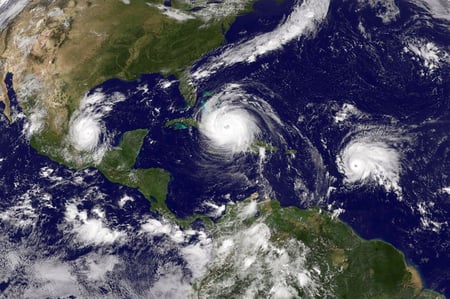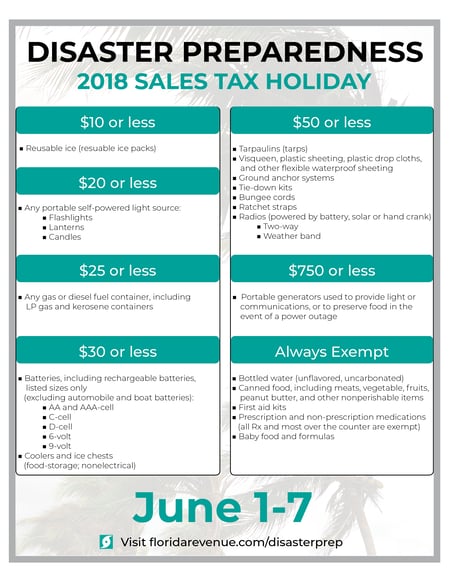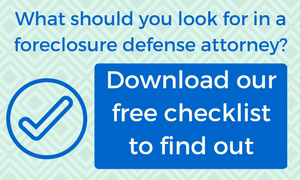 2017's Atlantic hurricane season was one of the strongest ever, with three Category 4 storms hitting the U.S. (Irma in Florida, Maria in Puerto Rico, and Harvey in Texas) causing billions of dollars in damage and thousands of deaths. Unfortunately, the 2018 Atlantic hurricane season, which runs from June through November, is expected to be above average in terms of number and intensity of storms.
2017's Atlantic hurricane season was one of the strongest ever, with three Category 4 storms hitting the U.S. (Irma in Florida, Maria in Puerto Rico, and Harvey in Texas) causing billions of dollars in damage and thousands of deaths. Unfortunately, the 2018 Atlantic hurricane season, which runs from June through November, is expected to be above average in terms of number and intensity of storms.
As of this writing, two people have already died in flooding caused by tropical storm Alberto.
For 2018, forecasters are predicting 14-18 named storms, 7 hurricanes, and 3 hurricanes of category 3 or higher. So, it's a good idea to take all necessary precautions to protect you and your family's well-being and property from the effects of any storms that might come your way.
The National Hurricane Center says that there are two keys to weather safety:
- Prepare for the risks.
- Act on those preparations when alerted by emergency officials.
You can visit the National Hurricane Center's website to read all of their tips on safety during the hurricane season, but here are some of things to take into consideration as you prepare for potential storms.
Gather information and understand the risks
You can't effectively prepare and act if you don't have an understanding of the risks you're facing and what to do about them. You need to know things like whether or not you live in an evacuation area and how vulnerable your home is to flooding and wind. You can go to the government website here and select your state and region to find out what kind of emergencies can occur where you live, and how you can respond. The National Weather Service and your local government are also good resources for information.
Prepare & Take Action
Once you have an understanding of the risks you're facing, you can start to prepare and take action.
Emergency Supplies
In South Florida, one of the dangers is having to go without electricity and other vital services following a hurricane. So if you live there, you'll want to have a well-stocked emergency supply kit. It's recommended that you have at least three days worth of water and non-perishable food, as well as batteries, a radio, and a flashlight.
 Florida has a disaster preparedness sales tax holiday, which runs from June 1 through June 7, 2018. During that week, batteries, flashlights, generators, and more can be purchased tax-free. (Bottled water and canned food are always exempt.)
Florida has a disaster preparedness sales tax holiday, which runs from June 1 through June 7, 2018. During that week, batteries, flashlights, generators, and more can be purchased tax-free. (Bottled water and canned food are always exempt.)
If you need any of these items, take advantage of the tax-free holiday to get them at a discount.
Evacuating
You should think about where you and your family will go if you have to evacuate. Have a plan for where you will take your animals as well. When the authorities tell you to evacuate, you need to evacuate and not return until the area is declared safe.
Protecting Your Home
In addition to physically protecting your home by covering your windows, if necessary, you should also guard against threats that could cause you to lose your home to foreclosure. Months after Hurricane Irma, we are hearing from many homeowners who tell some version of the following story:
Unable to make their mortgage payments due to missed work and extra expenses caused by the storm, homeowners accepted their bank's offer of a forbearance plan that allowed them to miss a few payments. The bank said not to worry, that they would not be put into foreclosure, and after the forbearance was over they would work with them to get their mortgage back to normal, maybe with a loan modification or just putting the missed payments on the back of the loan. But when the forbearance was over, instead of working with them, the bank put them into foreclosure for missing payments!
Learn from these homeowners' experiences. If your bank offers you a disaster-related forbearance, make sure you understand what the consequences of it are. And don't take the bank's word for anything. Get offers in writing.
With a little bit of planning and awareness, you can protect yourself from the worst effects hurricanes and tropical storms could bring this season. Again, please take the authorities' advice when they recommend or require evacuation. It may be inconvenient to leave your home, but you and your family's safety is the most important thing.










